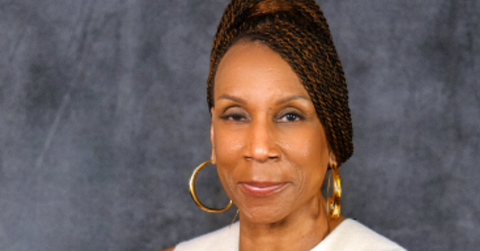In a marketing landscape full of constant change, few have made their mark with the same level of influence and creativity as has been achieved by Jerri DeVard throughout her career. As founder and chief executive officer of the Black Executive CMO Alliance, also known as BECA, Jerri has done more than shape some of the world’s most iconic brands; she’s reshaping the future of marketing leadership itself. From working with industry giants like Verizon, Pillsbury, and scores of other Fortune 500 companies to founding BECA in 2021, her journey is a career of excellence and intentional change-making.
Through BECA’s flagship program, the BECA Playbook, Jerri is actively developing the next generation of Black marketing executives, creating a powerful ripple across the industry. Her approach to marketing is refreshingly straightforward yet profound: know what you’re selling and who you’re selling it to. This simplicity, combined with her deep understanding of how to build desire and connection with consumers, has made her one of the most respected voices in the industry.
Below, in this interview with Her Agenda, Jerri shares what she’s learned from this exceptional journey, what the future of marketing will be amidst AI, and, of course, imparts wisdom for future marketing leaders. It is a story that deals with a lot more than success: how she created change in this world and left a mark in the field of marketing.
Her Agenda: What motivated you to step into a role as a change-maker for Black executives in marketing?
Jerri DeVard: I wouldn’t say that I stepped into a role to be a change-maker for Black executives in marketing. I happen to be a Black executive in marketing. The change that I wanted to create was much broader in scope in terms of brands and their customers, their reputation, their profitability, and their growth.
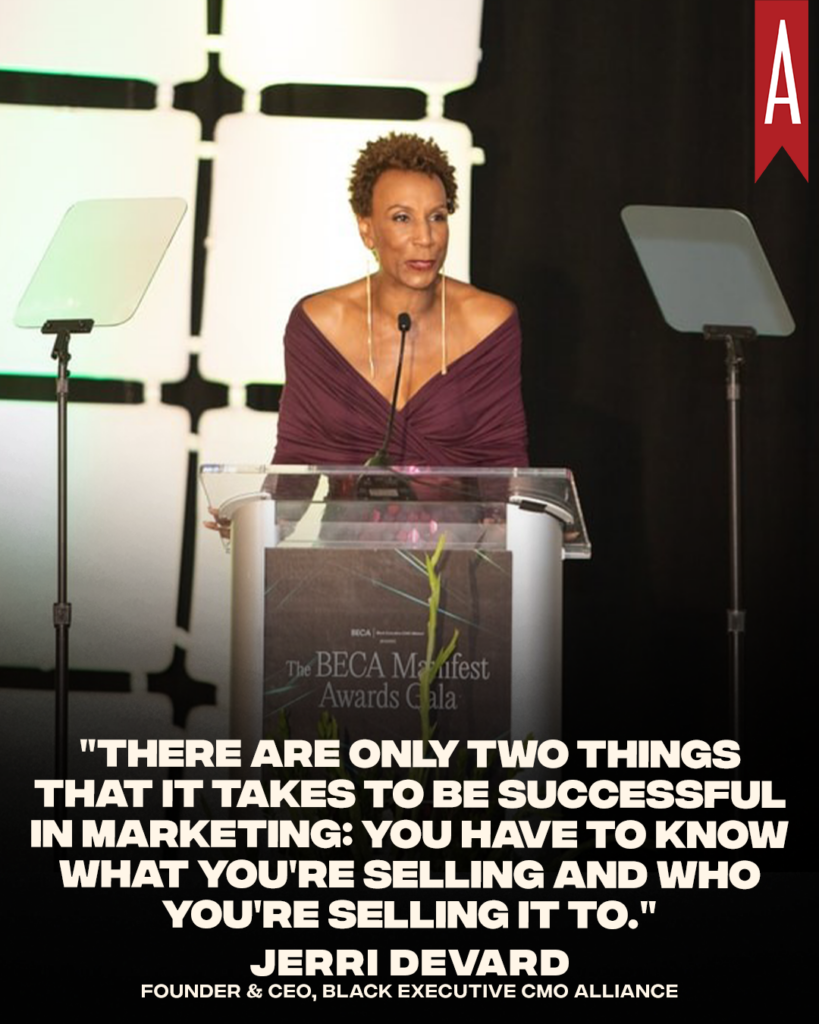
Her Agenda: Can you tell us about how you first got into marketing?
Jerri DeVard: What attracted me to marketing was really an internship that I had when I was in graduate school that made me realize that I wanted to become a marketer. Then wanting to be a marketer, I wanted to learn from the best companies that were out there. I also had some internships that told me that I didn’t want to be an engineer. When I was in college, I had engineering internships because before I became an econ major, I majored in engineering.
Her Agenda: What unique challenges have you faced in marketing?
Jerri DeVard: In marketing, there are always people who feel that they can do it better, faster, cheaper, more efficiently, and more effectively. Some organizations are misguided into thinking that marketing is a cost center rather than revenue generation. They tend to look at the investment in the company, the brand and your customers, and your growth as expenses as opposed to investments. The challenge is proving to people that what you’re doing does affect the top and bottom line, that it’s not subjective, and that it’s not just someone’s opinion. It’s based upon some science and some insights, but also some intuition and gut around what you think is best.
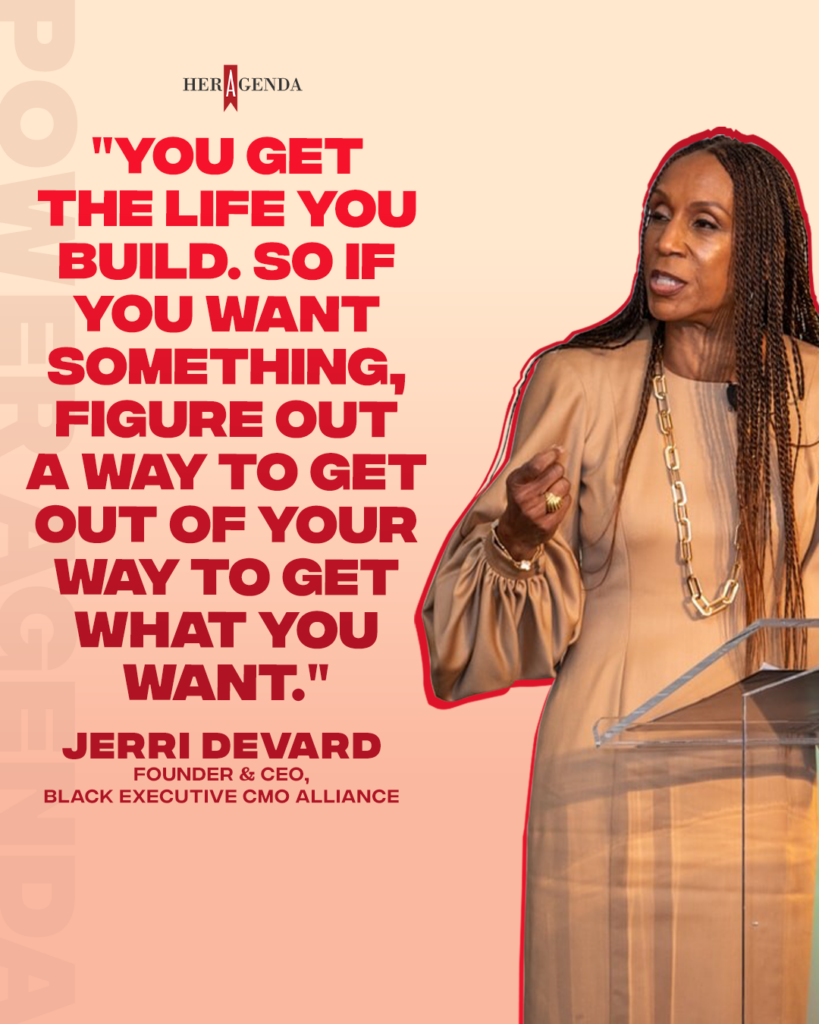
Her Agenda: Can you tell us about BECA and its mission?
Jerri DeVard: BECA stands for the Black Executive CMO Alliance. It is a trade organization made up of Black C-suite executives. We have presidents and CEOs and COOs and chief revenue, chief brand, chief experience, and chief growth officers. You have to be the top marketer in your organization to be a member of BECA. The organization was started in 2021, and we come together for four things – this is our bible: we share, learn, elevate, and pay it forward. If we’re not doing one of those four things, then we’re not doing BECA.
Her Agenda: What specific programs does BECA offer?
Jerri DeVard: We have a program that we co-developed with Deloitte called the BECA Playbook. It recruits mid-level, mid-career Black marketing, and marketing-adjacent professionals at the manager, senior manager, or director level. It’s a two-year journey where participants are sponsored by their organization. They have to be high potential, commit 100+ hours to the program, ensure they’re going to pay it forward for the next generation and attend all sessions. Every other week, there is a session with a subject matter expert who may or may not be a BECA member.
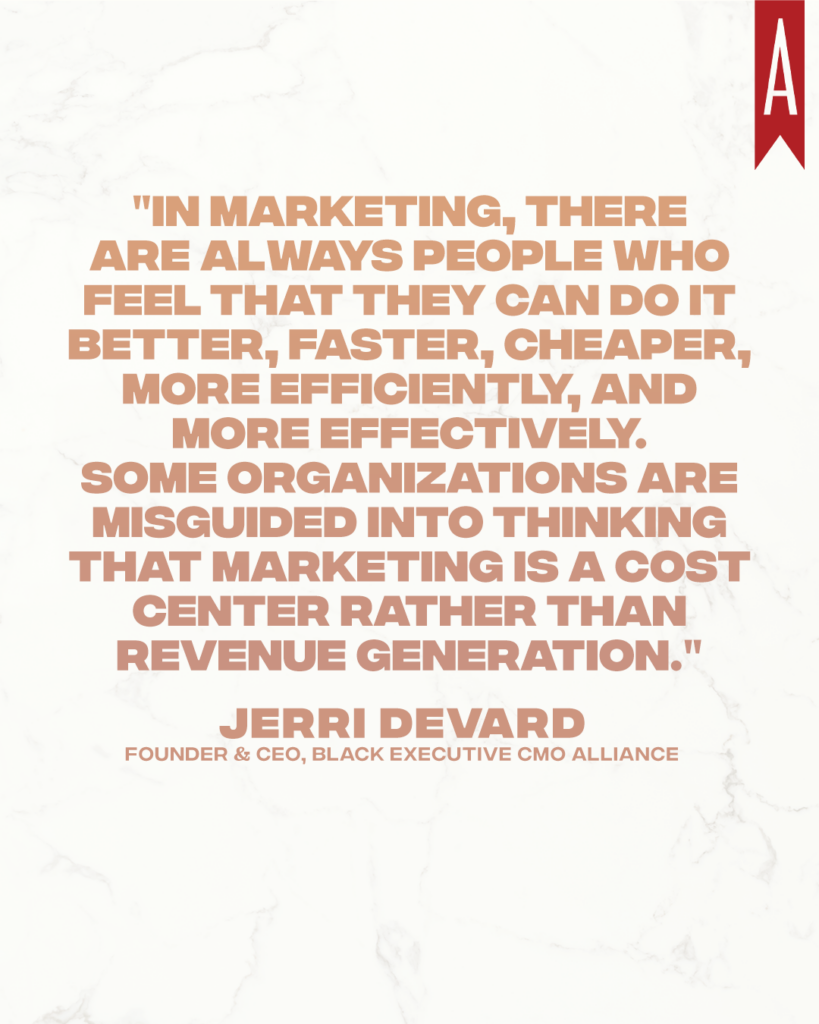
Her Agenda: Have you seen success stories from the BECA Playbook program?
Jerri DeVard: Yes, in our first class, 25% of our future leaders received a promotion to VP, and 50% received additional responsibility. They credit BECA for their success, saying what they learned gave them the ability to be successful in their organization. We’re approaching 100 future leaders with four cohorts running. We now have two alumni groups, and 95% of them said it was worth their time and making them better marketers.
Her Agenda: What’s your favorite thing about marketing?
Jerri DeVard: My favorite thing about marketing is that you can build desire. I’ve worked on new products that had no customers, no consumers, and no revenue, and you can see how you can build that in a way that is sustainable and convinces people that your brand is better than others. Everything you buy is a function of marketing, and to work for iconic brands and be able to say, ‘Yes, because I told a story that was relevant’ – that’s powerful.
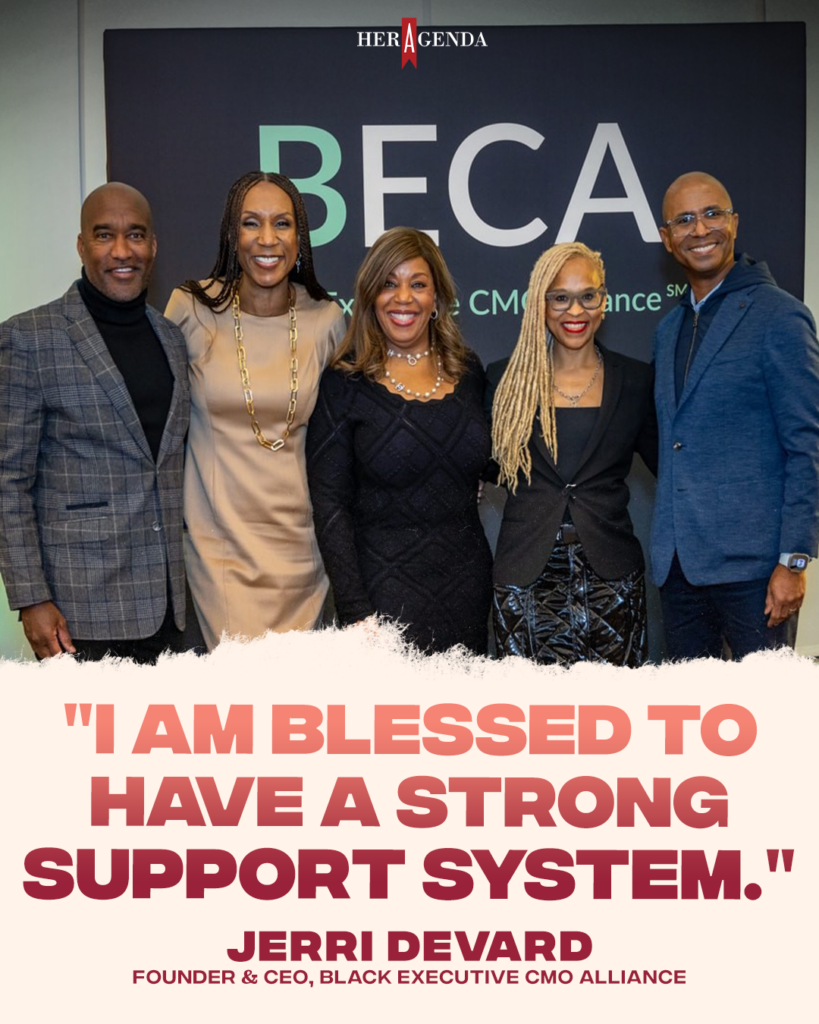
Her Agenda: What do you think are the key elements to being successful in marketing?
Jerri DeVard: There are only two things that it takes to be successful in marketing: you have to know what you’re selling and who you’re selling it to. Once you get that, you’re good. But you get twisted when you don’t know the answer to one of those. The task is simple, but the execution is complicated.
Her Agenda: Who has been one of your most influential mentors?
Jerri DeVard: Bruce Gordon at Verizon will always have a sweet spot in my heart. He was the first person that really demonstrated to me what true leadership was. He was someone who was idolized from the mailroom to the boardroom, who understood not just marketing but how to run a $39 billion business. He showed me that the skills to be successful were not a zero-sum game – that you could be kind and empathetic and smart and funny and approachable and caring and be a great leader and get the job done.
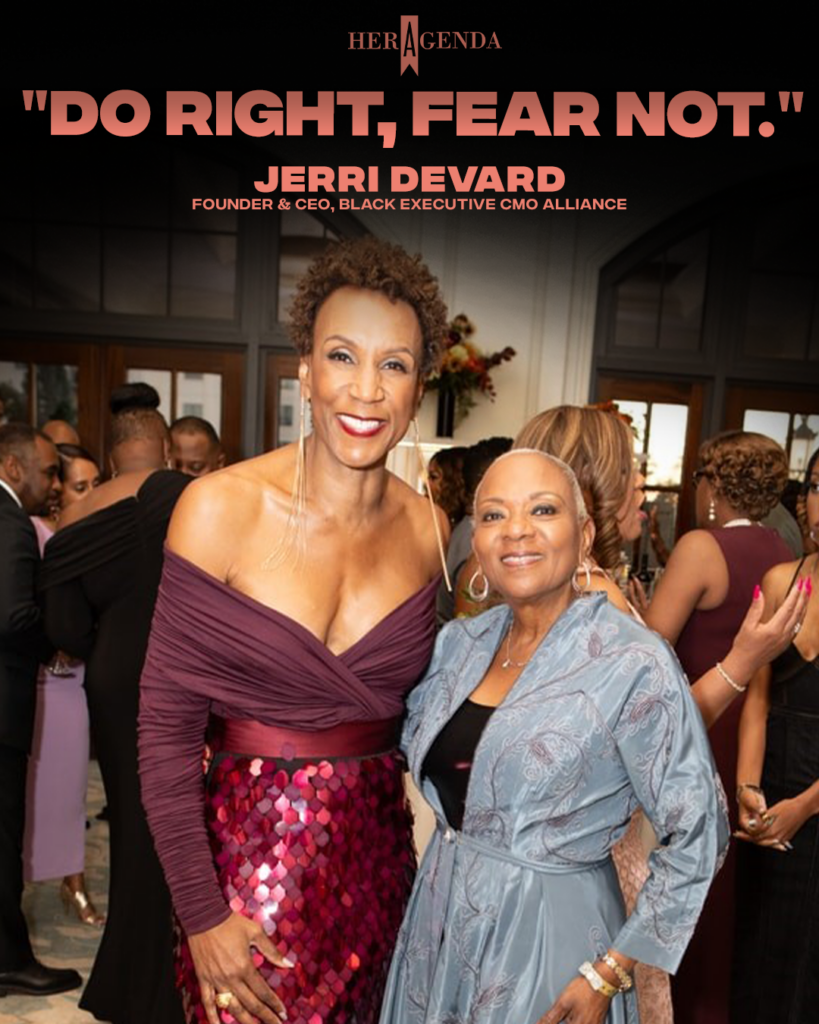
Her Agenda: How do you envision the future of marketing?
Jerri DeVard: AI is revolutionizing marketing in good ways. While we should be skeptical, there’s the ability to leverage tools of generative AI to make the business better. It can be amazing for customer service, testing ideas, campaigns, messaging, taglines, and positioning. These are ways to efficiently process ideas and get feedback that saves time and money. But marketing should always be the voice of the customer – that should never change, even as our tools evolve.
Her Agenda: How do you balance the high-pressure nature of your career?
Jerri DeVard:I am blessed to have a strong support system. I’ve been married to the same man for 42 years. I still love him. He still loves me. I have two incredible children, one who has blessed me with two grandchildren. My mother just turned 90, my dad is 101. My brother and I are close. I have many friends – these are the people that will be at my funeral. These are the people that I love and truly love unconditionally. I’m blessed to have that.
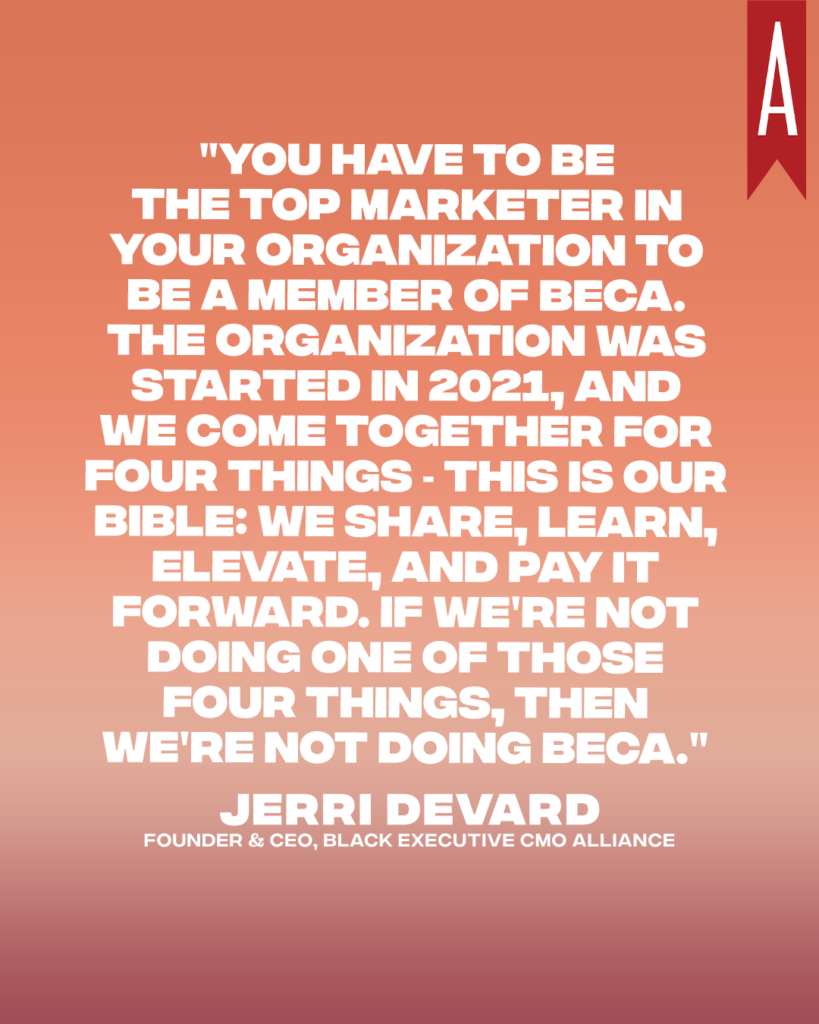
Her Agenda: What legacy do you hope to leave through your work with BECA and your broader career?
Jerri DeVard: The legacy of building future leaders. That’s why we call the mid-career professionals who participate ‘future leaders.’ The apostles, the graduates, the folks that go out and change the world as a result of what they learned from us – that’s the legacy. It’s not the title I had, the job I had, the boards I served on or achievements. It’s about the people that we made a genuine connection with that was sincere, real, meaningful, and everlasting. As Maya Angelou said, people won’t remember what you said, but they’ll remember how you made them feel. That’s what I work on.
Her Agenda: Do you have a mantra or saying that you live by?
Jerri DeVard: Do right, fear not. If you’re doing the right thing, there’s nothing to fear. If you’ve done what you think is your best, and it was right, don’t second guess it. Don’t beat yourself up about it. Don’t run from it. People want to sometimes always appear to be the best version of themselves. You can’t always do that. And if you’re always the best version of yourself, then how do I know who you really are? Success has a thousand parents, and failure is an orphan. So be yourself, but do the right thing ethically, morally, and spiritually. And then don’t worry about it.
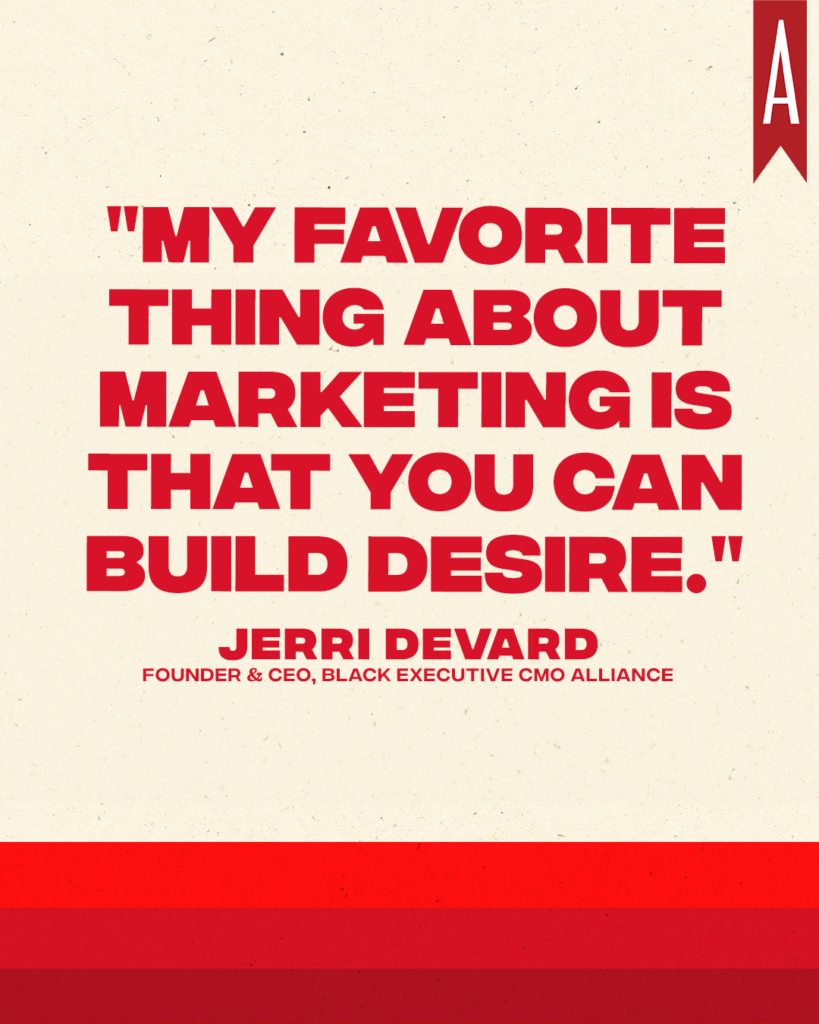
Her Agenda: What advice would you give to someone who’s thinking about getting into marketing but feels hesitant?
Jerri DeVard: You’ve got to know your ‘why.’ If you haven’t gotten in, why? You’ve got to overcome that before you can do it. As Lauryn Hill says, ‘How are you going to win when you ain’t right within?’ Why haven’t you done it? If you can unpack the why, then I think that will empower you to get what you want. Sometimes, we’re our own worst enemy. We doubt, we second guess, but why not? You get the life you build. So, if you want something, figure out a way to get out of your way to get what you want.
[Editor’s note: This interview has been edited for length and clarity.]

